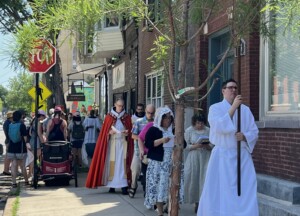It’s been awhile since I last addressed this subject. Evagrius, Cassian and Maximus offer a good deal of technical advice, and we should make a habit of regularly reviewing their teachings. What I offer tonight is a reflection on my own experience in the spiritual battle, including insights from spiritual direction with many monks, priests and others over the years.
Our thoughts are not ourselves. This can’t be overstated. Just because we have a thought or a feeling, no matter how intense it is, does not make it worth our time or worry. All thought should be subject to discernment.
I say this because I have watched well-intentioned people get very hard on themselves for having certain kinds of thoughts. Yes, sometimes we bring these on ourselves by our earlier choices. But this still doesn’t mean that we will make any progress by getting sad about having them, or getting angry or frustrated with ourselves or others.
Any thought can be let go of, or we can at least loosen its grip on ourselves. It is a good practice, maybe ten minutes a day, just to sit still and watch our thoughts. There are many images for how to do this, and how to learn to disengage from a thought. One is to imagine thoughts as so many boats floating down a stream. It’s alright to look at what is in the boat, but don’t get in the boat yourself; let it float away.
Another way to disengage is to use a word or short phrase. I often use, “Amen,” or “Jesus,” or “Jesus, Mary, Joseph,” or “Holy angels of God.” In some ways, the content doesn’t matter. The words are there to place gently upon whatever thought we wish to let go of. Many thoughts recur frequently. The worst thing we can do is get angry because they won’t go away. Again, if I have an angry thought against a brother, I take the word “Amen,” and set it lightly upon that thought and let it go. If it returns, I’m not surprised, I’m not impatient; I simply make the same action of reciting my sacred word and moving on.
Making a habit of doing this intentionally each day is very useful because we learn—slowly, eventually—not to get taken in by thoughts when they surprise us.
Another important habit to cultivate is to question our thoughts, especially if we can notice that a thought has accompanied us into the monastic life from our families, workplaces, or local cultures (for example, urban life, country life, academia, the art world, the military). What was the right way to sweep a floor at home might not be the way the community wants me to do it. If I’m corrected, I am offered the opportunity to let go of another kind of thought.
A particularly pernicious thought is the idea that I have some responsibility to change someone else, to focus on his faults and figure them out. Let’s figure ourselves out first. But we can’t do this, frankly, if we’re always right. All that means is that we never get to the bottom of our prejudices and preferences. If we are always angling to get our way, even if we cloak it under the pretense of helping other to do things “the right way,” we will never question our thoughts. We will never broaden our horizon.
It’s good to ask questions, to be the dumbest person in the room. To be curious about what other people’s experiences are. To notice how others do things differently, especially when they seem to excel in something.
In the best case scenario, we would have holy mentors. But would we even know whether they were holy? That’s another thought, and I’m not sure we’re well-positioned to recognize real holiness or insight. But we can always gain valuable experience by trying out someone else’s method of action. And God will reward us for our self-denial.
